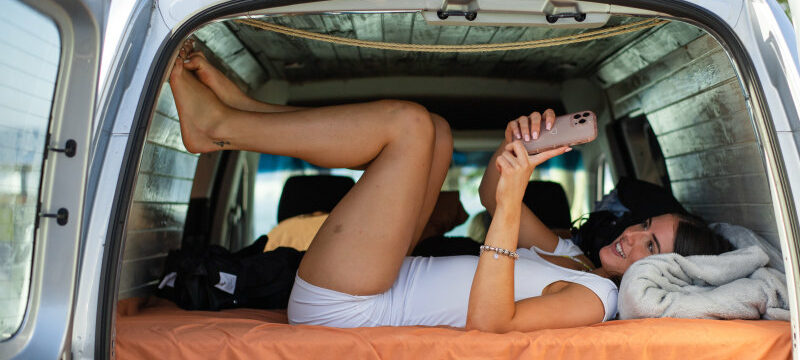Save articles for later
Add articles to your saved list and come back to them any time.
Trading in a nine-to-five to live on the road is appealing to a growing number of Australians embracing “van life” – a nomadic, often Instagrammable way of living.
But it’s the non-Instagrammable moments no one prepares you for: screaming children, zero personal space and dumping out the family’s sewage.
Hannah Bindon from New Zealand has been in Australia for one week and is loving van life – so far.Credit: Elise Derwin
Van life is exploding in popularity. The Caravan Industry Association of Australia reported there were 12.8 million overnight trips in the past financial year, with the sector bouncing back to pre-COVID levels.
Hipcamp, an online booking platform where private landowners can list camping and caravan sites for use, experienced a 600 per cent increase in bookings globally since 2019.
Caravan and van rental company Camplify has experienced exponential growth in bookings since COVID-19, reporting a 413 per cent increase from 2020 to the end of the 2022 financial year.
Jess Tsigros and her husband Leon sold their home to travel around Australia with their two young children Olimpia and Aalia, then aged two and three, in 2021.
But 10 months in and a little over halfway through their journey, they decided to head home.
Aalia, Olimpia, Leon and Jess Tsigros sold their home to travel around Australia.
“We needed a break. Mentally and emotionally, we were exhausted from travelling with the two little ones. We said ‘you know what, we’re tired’, and we made the call [to return],” she said. “It’s taxing on your marriage, and as a family, it can be hard.”
Tsigros said she missed home comforts – from regular catch-ups with friends and family, a gym membership, a regular hairdresser and being able to book in for a facial.
“I was leaving behind a really good lifestyle to embrace another experience to live out of a shoebox,” she said.
The family cut their trip short after realising van life was harder than expected.
Personal space was another huge issue: The couple took turns getting away for the day and leaving the other with the children, but it meant they missed out on experiences together.
“The best part of van life is being together, and the worst part is being together.”
Returning home has been an adjustment for the kids, who aren’t used to being away from mum and dad for extended periods of time.
Still, the family doesn’t regret it. Tsigros published a children’s book called We Live in a Caravan, while Leon did the groundwork to start his own tow safety company while on the trip.
Hannah Foulkes and Hannah Bindon from New Zealand have been in Australia for one week loving van life, even if it’s cramped.Credit: Elise Derwin
They still use the caravan for shorter getaways, but wouldn’t commit to living in it indefinitely again.
“The biggest takeaway was the self-reflection that we did,” Tsigros said. “The trials and tribulations made us stronger and made us more keen to create a better life for ourselves when we came back.”
Hannah Foulkes and Hannah Bindon arrived from New Zealand and rented a van from Camplify on Wednesday. They plan to spend a week travelling around Southern Queensland, starting in Byron Bay.
“There are definitely pros and cons,” Foulkes said.
Finding a place where they can legally spend the night has been a struggle, and their van doesn’t have a shower, running water or a bathroom.
“You can’t sit up, so it’s pretty tight … but so far, it’s been awesome,” she said.
While she’d consider a longer trip, she “definitely couldn’t live out of a van”.
Tammi Keirl and her family also cut their trip short when the reality of living on the road set in.
In December last year, she and her husband Jason Weller decided to take their two children Ruby and Savannah, then aged five and three, out of school to travel around Australia with a caravan for at least a year.
They lasted just four months. “It was taxing on our marriage,” Keirl said.
She also wasn’t prepared for how not having personal space would affect her, where stepping away from the family meant being out in public.
Nor was she prepared to have to empty the caravan’s toilet, taking “their poos for walks” to empty the sewerage tank.
Keirl continued to run her small businesses online while Weller homeschooled the kids which added to the couple’s stress.
“I regret nothing, and it was a beautiful experience,” Keirl said.
“But I think to do the lap of Australia, you have to be retired to really soak it all up and enjoy every part of it.”
Most Viewed in National
From our partners
Source: Read Full Article




